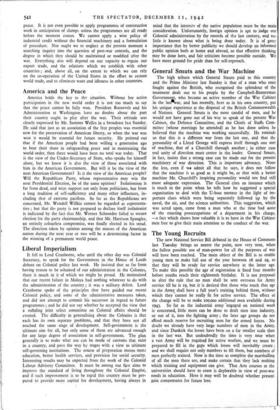The Young Recruits
The new National Service Bill debated in the House of Commons last Tuesday brings us nearer the point, now very near, when the fullest possible use of man-power for all the purposes of war will have been reached. The main object of the Bill is to enable young men to make full use of the year between 18 and 19, so that they will be ready for service anywhere at the latter age. To make this possible the age of registration is fixed four months before youths reach their eighteenth birthday. It is not proposed to alter the rule that no man shall be sent overseas for Army service till he is 19, but his desired that those who reach that ige in the Army shall have a full year's training behind them, without which they cannot be really fit for active service. The effect of the change will be to make roopoo additional men available during 1943. So far as the industrial army engaged on national work is concerned, little more can be done to draft men into industry, or out of it, into the fighting army ; the later age groups do not afford much reserve for recruiting men for the armed forces. No doubt we already have very large numbers of men in the Army, and since Dunkirk the losses have been on a far smaller scale than in the last war. But undoubtedly the time is very near when a vast Army will be required for active warfare, and we must be prepared to fill in the gaps which losses will inevitably create ; and we shall require not only numbers to fill them, but numbers of men perfectly trained. Now is the time to complete the marshalling of all the men there are, and make certain that they lack nothing which training and equipment can give. That Arts courses at the universities should have to cease is deplorable in view of post-war needs in education. Here it may well be doubted whether present gain compensates for future loss.


























 Previous page
Previous page